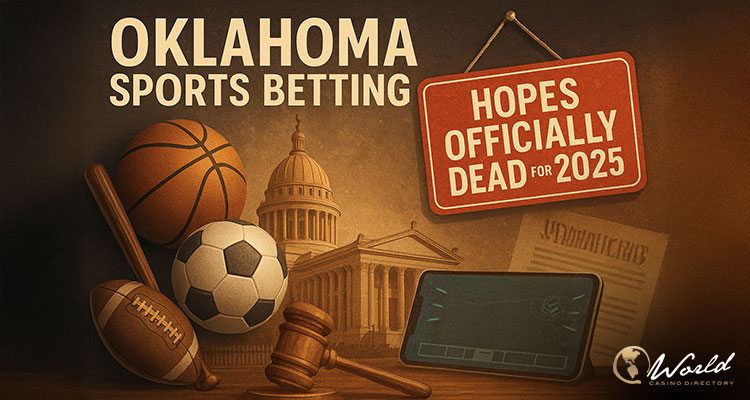Efforts to legalize sports betting in Oklahoma have once again ground to a halt after the state Senate failed to act on two key bills before the legislative session ended. Despite passing through the House with strong bipartisan backing, both House Bill 1047 and House Bill 1101 were left untouched in the Senate, officially dooming the state’s chances of establishing a legal sports betting framework in 2025.
The legislative cutoff on May 8 marked the final opportunity for the Senate to vote on the proposals, according to Sports Betting Dime. Without approval, the bills are effectively dead, leaving proponents eyeing 2026—or possibly later—for the next viable chance at legalization.
Breakdown of the Failed Proposals
Authored by Rep. Ken Luttrell (R-37), the two companion bills sought to expand tribal gaming compacts to allow for both in-person and mobile sports wagering exclusively on tribal lands. House Bill 1047 aimed to establish the legal framework, while HB 1101 included a voter referendum option, placing the matter on the 2026 ballot if the former bill was vetoed.
Despite their strategic design, neither piece of legislation found traction in the Senate. And even if they had, they faced an uphill battle with Governor Kevin Stitt, who made it clear he opposed the approach outlined in the bills.
“None of the bills that have moved off the floors of the House or Senate have gotten my input on them. As a matter of fact, they’ve excluded the Governor of the state of Oklahoma from these discussions,” Stitt said previously. “When they say that all stakeholders have come to the table and agreed on something, the taxpayers that are represented by the Oklahoma Governor has not weighed in on those things.”
Governor Stitt’s Alternative Vision
Stitt’s objections centered on his opposition to giving tribes exclusive rights to sports betting. Instead, the governor has championed a “free market” model where multiple operators, including non-tribal entities such as the state lottery and horse racing venues, could bid for licenses.
His own proposal, introduced last year, would have required public bidding for online sportsbook licenses, opening the market to both tribal and commercial operators. However, the plan never received a vote, in part due to strained relations with Oklahoma’s tribal nations, who argue that their exclusivity rights under current compacts should extend to sports betting.
In his framework, retail sports betting would remain tribal-exclusive and taxed at a 15% rate, while online betting licenses would be competitively auctioned, with licensing fees applicable to all winning operators.
Divisions Between Tribes and State Leaders
The core obstacle to legalization remains the deep divide between tribal leaders and the governor. Tribes have consistently rejected any proposal that doesn’t preserve their exclusivity in the gaming space. They argue that broader participation by commercial operators violates existing gaming agreements and potentially the state constitution.
The Oklahoma Indian Gaming Association had even helped craft the language for Luttrell’s bills, emphasizing tribal preferences. However, with Stitt promising to veto any legislation that granted exclusive rights to the tribes, legislative momentum stalled.
“The biggest challenge I have noticed through this process has been a lack of communication—no one is sitting down and talking through this,” said Sen. Bill Coleman (R-Ponca City), who led Senate efforts this session. “That’s why I’m seriously considering hosting an interim study this summer to bring all stakeholders to the table.”
The Thunder Bill and Other Legislative Paths
Among the most notable proposals this session was SB 585, dubbed the “Thunder Bill” and spearheaded by Sen. Coleman. This unique bill allowed the Oklahoma City Thunder to obtain a license to facilitate sports betting—marking the only legislation this year that offered a role for a non-tribal entity.
Although SB 585 narrowly passed the Senate after a second vote (25-21), Coleman ultimately withdrew the bill before it could reach a House committee, citing lack of unified support.
SB 585 would have enabled the Thunder to sublicense wagering rights to a tribal-approved operator for both online and physical betting on non-tribal land—an unprecedented arrangement in the state.
What’s Next for Oklahoma?
With all 2024 efforts now extinguished, stakeholders are turning their attention to 2026 or 2027, when the political landscape may shift. By that time, Governor Stitt’s term will be nearing its end, and a new administration could take a different approach to negotiating with tribal nations.
Some also see potential in reviving a ballot initiative, similar to the strategy used in 2003 to legalize the state lottery. Under state law, a voter-approved measure would bypass the need for gubernatorial approval, making it an attractive option for tribes unwilling to compromise on exclusivity.
Currently, Oklahoma remains one of only 11 states without legalized sports betting. Meanwhile, neighboring states like Kansas and Arkansas have already launched sportsbooks, and with Texas unlikely to approve sports betting anytime soon, Oklahoma could stand to gain significant revenue if it can overcome its political hurdles.
Sen. Coleman summarized the missed opportunity this way: “I’ve been working on sports betting for years and truly believe Oklahoma is missing out on a significant opportunity—both economically and in terms of consumer protection.”



